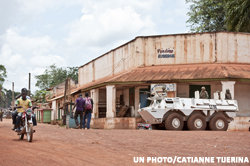
The crisis in the Central African Republic (CAR) has been largely absent from international media recently, except for disturbing reports about sexual abuse against civilians by U.N. peacekeepers. But violence and insecurity have not stopped and large parts of the country remain in the hands of armed groups that terrorize local populations. Just last week at least 20 people were killed in the central town of Bambari, where Christian, Anti-Balaka militias and Muslim fighters from the Ex-Seleka clashed over the death of a young Muslim. Bambari, which hosts a lucrative cattle market and the country’s largest gold mine, has long been a contested area and a front line in the CAR conflict, where armed groups fight over proceeds from illicit taxation of business owners and for control of the gold and diamond mines. The U.N. Security Council and the U.S. Office of Foreign Assets Control took important steps to counter such illicit trade by freezing assets and imposing a travel ban against three members of the armed groups and a major diamond company, Badica/Kardiam, that has long been trading diamonds with armed groups in CAR.
Despite persistent fighting, France, which is the most powerful force in the country, continues to pull out troops and has reduced soldiers from 2000 earlier this year to 900 and plans to reduce troops further before year’s end. French President François Hollande seeks a swift exit from a costly mission that is becoming increasingly unpopular in Paris. This desire has pushed CAR’s presidential and legislative elections on top of the political agenda, and they are now scheduled for October 2015. The U.N. peacekeeping mission and the national Elections Authority have started to register voters, but lack funds to complete the electoral preparations in time. Meanwhile, religious leaders from CAR have voiced concern that speedy elections could lead to renewed violence without disarmament of the armed groups. Just last week, Imam Oumar Kobine Layama, the president of CAR’s Islamic Council, said that “we are afraid the weapons will get to vote, instead of the people.”
The political process in CAR took important steps towards stability with the Bangui Forum in May that brought together civil society groups, local leaders and members of the armed groups to chart a common way forward for the impoverished country. Most importantly, an agreement was made on Disarmament Demobilization and Reintegration (DDR), which was signed by nine armed groups and the Transitional Government. But since then little follow up has been made and the international push for speedy elections has forced other priorities aside. International policy makers from France, the European Union, the UnitedStates and the United Nations should listen to the important warnings from local religious leaders and make sure that substantial progress is made on DDR before elections take place – even if this means delaying the current timeline. Otherwise, the country faces a very real risk of falling back into widespread sectarian violence.
Photo Credit: UN Photo/Catianne Tijerina

